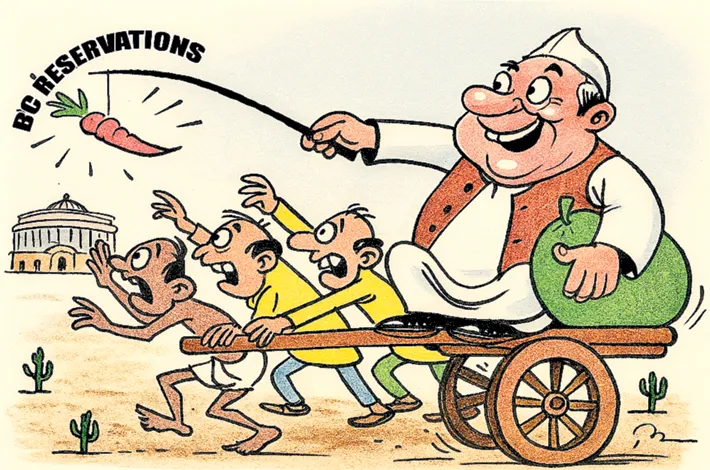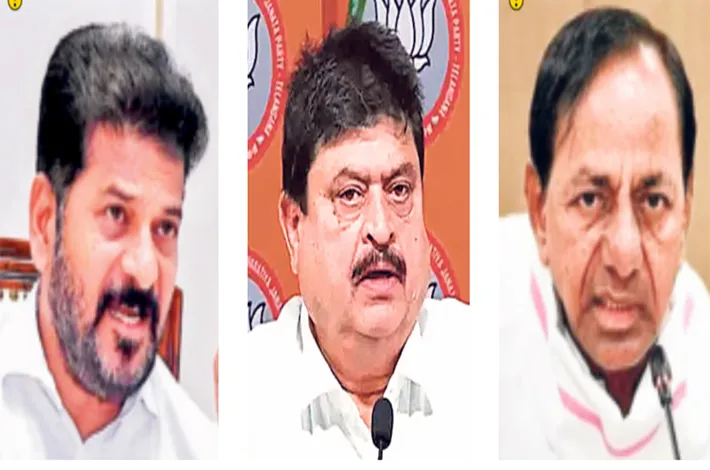BCs Betrayed Again
25-10-2025 12:00:00 AM

Political Gains, Empty Returns
All sections of society are progressing and experiencing social, economic, and political benefits aligned with their aspirations. However, Backward Classes (BCs), despite constituting a significant portion of the population, continue to face challenges in achieving their expected share of development. Historically, political parties and governments have often viewed BCs primarily as vote banks, which has impacted the focus on their broader socio-economic empowerment.
The recent developments around the implementation of 42 percent BC reservations stand as proof of this. Looking at the Congress government now in power, the decades-old dream of BCs seems as distant as ever. Over the past two years, the twists and turns surrounding BC reservations clearly expose how political interests have overshadowed genuine concern.
In fact, the BCs played a decisive role in bringing about a change of government in the 2023 Assembly elections. The Congress party, which announced its BC Declaration at Kamareddy on November 10, 2023, earned the trust of BC voters who believed their long-pending demand for reservations would finally be realized. But while the Congress gained electorally from the promise, the BCs gained nothing in return.
Though the party vowed to implement 42 percent reservations for BCs, the promise has remained unfulfilled. The government’s half-hearted and impractical efforts have now laid bare its lack of sincerity. The much-hyped reservation for BCs has turned into a mirage — an unattainable dream.
Reservation Promise – The Key That Changed Power
The BC reservation issue was a major factor behind the fall of the BRS government, which had ruled Telangana for a decade. Despite several efforts during its tenure, the issue never materialized. The Congress party exploited this political vacuum by promising 42 percent BC reservations within six months of coming to power.
BC voters, trusting this pledge, rallied behind Congress in large numbers. However, after assuming power, the Congress government failed to translate its promise into reality. It announced plans for a comprehensive social, economic, educational, employment, political, and caste survey across the state and allocated ₹150 crore for it.
A new BC Commission was promptly formed. But some BC leaders approached the High Court, arguing that the survey was not legally valid and demanded a separate commission. Subsequently, the government constituted a special commission under Busani Venkateswara Rao.
The Caste survey concluded that BCs, including Muslims, made up 56 percent of the state’s population. However, several BC organizations objected, alleging that the figures were deliberately underreported. Despite this, they held out hope that at least the 42 percent reservation would be implemented.
The government introduced a bill in the Assembly and sent it to the President for approval. When the bill remained pending, it issued a special ordinance, which then got stuck with the Governor. Under mounting pressure from BC communities and judicial deadlines for local body elections, the government issued a special GO to move forward. Yet, all these efforts brought no real benefit to BCs.
Judicial Hurdle: Law Amendment, The Missing Link
In reality, enhancing reservations beyond the 50 percent limit requires a constitutional amendment in Parliament. The example of Tamil Nadu, which secured 69 percent reservation by including it under the Ninth Schedule, shows that such measures demand national-level legal changes.
However, the Central Government objected to Telangana’s approach, citing that the BC population survey lacked scientific validity and that Muslims were wrongly included in the BC category. It also pointed out inconsistencies in the caste classification.
Without an amendment to the law, all the state government’s measures — be it Assembly resolutions, ordinances, or GOs — lack legal standing. The Supreme Court’s 50 percent cap on reservations remains binding, and courts have reiterated that no state can exceed this ceiling. Consequently, both the High Court and Supreme Court intervened, instructing the Telangana government to conduct local body elections under the old reservation formula.
Government’s intention under question
Observers say the Congress government is fully aware that legal amendment is essential for implementing higher BC reservations. Having ruled India for decades and Andhra Pradesh for years, the Congress cannot claim ignorance of this constitutional requirement.
Critics argue that the Congress government is misleading the BCs, making hollow promises it knows cannot be fulfilled. After winning the elections by banking on BC votes, the party has now adopted an indifferent stance.
Recently, the government announced that it would consult legal experts once again to decide on the reservation issue. However, it has already done so multiple times — during the survey, before issuing the GO, and while approaching the courts. Despite repeated legal consultations, the government continues to overlook the core issue: reservation is not possible without amending the law.
BC leaders question how many more “expert consultations” the government intends to hold. With half its term already gone, critics warn that if delays continue for another three years, the opportunity to act will be lost. The BCs express deep frustration that the government is engaging in futile exercises instead of implementing real solutions.
Political Game: Smearing the opposition
Since the Congress included the 42 percent reservation in its manifesto, opposition parties, BC organizations, and experts have consistently pointed out that a constitutional amendment is mandatory. Yet, the ruling Congress has ignored these warnings and instead sought to shift blame.
The government claims it is making all-out efforts to secure reservations while accusing BRS and BJP of creating obstacles. However, both opposition parties have expressed willingness to support any genuine move for BC empowerment. The BRS had declared its support for BC reservation, while the BJP declared readiness to amend the law if accurate BC population data were provided.
Despite this, the Congress continues to use the issue to malign its opponents, prioritizing political gains over BC welfare. BC communities now believe the government is playing with their sentiments, using their hopes as political leverage.
Given the repeated twists and turns, many argue that the Congress is knowingly misleading BCs rather than merely failing due to inexperience. The once-powerful promise of 42 percent BC reservation now stands as a symbol of broken trust — and of a community still waiting for justice.








